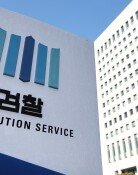HK Economy Keeps Rolling 12 Years After Handover
HK Economy Keeps Rolling 12 Years After Handover
Posted July. 28, 2009 08:23,
Central Station in downtown Hong Kong is comparable to Gwanghwamun subway station in central Seoul. A subway ride from Central Station to Luohu Station, where the main border between Hong Kong and Shenzhen, China, is located, takes 40 minutes.
Foreign nationals could require up to an hour to pass customs, but citizens of Hong Kong and mainland China with electronic pass cards can easily cross the border. Many cars with two license plates cross without difficulty. At Luohu, it is clear that Hong Kong and China have become united.
Freedom of movement has brought significant changes to the people of Hong Kong and mainland China. Hong Kong residents enjoy a higher standard of living due to cheap labor and service from mainland China.
Residents of Shenzhen have gained sudden wealth thanks to capital injected from Hong Kong. Many people live in Shenzhen but commute to work in Hong Kong. When the high-speed railway linking Guangzhou, Shenzhen and Hong Kong is completed in 2011, commuting between Shenzhen and Hong Kong will take just 13 minutes.
Since Hong Kong was returned to Chinese rule in 1997, the number of Chinese visitors to the city has skyrocketed. Before the handover, 2.1 million Chinese visited the island in 1996 but 4.1 million did so in 2002. The figure further soared to 12 million in 2004 and is now between 16 million and 17 million.
Over the past 12 years, the Chinese government has boosted domestic demand in Hong Kong by encouraging more Chinese to visit the island whenever Hong Kongs economy faces difficulties, such as the 1998 currency crisis and the 2003 bird flu scare. The citys economy was initially expected to decline in 2003 but grew three percent that year.
The Closer Economic Partnership Arrangement signed by Hong Kong and China in 2003 played the pivotal role in boosting the citys economy that year.
Under the agreement, Hong Kong was allowed to export duty free around 1,500 items including agricultural and marine products to China. Regulations were also eased or lifted in 42 service sectors. In short, Hong Kong has gained strong support from China after its return to the mainland.
The agreement created 43,200 jobs in Hong Kong between 2004 and last year. A worker at a store selling luxurious goods near Central Station said, Many rich Chinese visit the store and buy several items at a time. We used to consider people who spoke Mandarin poor and old fashioned but theyre now considered rich. Now, we treat them very well.
When melamine was found in Chinese-made dairy products last year, milk products in Hong Kong quickly were sold out as many Chinese visited the city to buy them.
China accounted for 40.3 percent of Hong Kongs trade in 2001 and 47.4 percent last year. The city last year also became the largest investor in China with 41 billion U.S. dollars and 43 percent of foreign investment on the mainland.
Seok Dong-yeon, Korean consul general in Hong Kong, said, Hong Kongs large investment in China shows Hong Kongs strong belief in Chinas future and potential. Companies dont advance into China without benefits, and are better than other types of organizations in having information on risk. Undeniably, Hong Kong corporations have top-grade data on Chinas present and future.
If you want to know China, you have to first understand Hong Kong.
Hong Kongs economy is also suffering from the global economic crisis, growing a mere 2.6 percent in the fourth quarter last year and contracting 7.8 percent in the first quarter this year. Businessmen in the city, however, predicted rosy prospects to the Dong-A Ilbo, with one saying, Chinas economy has bottomed out. That means Hong Kongs economy will get better soon.
Economist Dixon Ho of the Hong Kong Trade Development Council said, The economies of Hong Kong and China are already tied. Chinas economy is expected to grow for a prolonged period and Hong Kongs is also likely to recover swiftly.
The councils assistant executive director Raymond Yip added, China and Hong Kong are no different from family. Hong Kong was reverted to China, not returned, in 1997.
The office of the Peoples Liberation Army of China is in front of the councils headquarters, a building comparable to the Korea Convention and Exhibition Center in Seoul. Around 10,000 Chinese soldiers are stationed in Hong Kong, but finding them on the streets is hard since they wear plain clothes.
Consul general Seok said, China stays out of Hong Kongs domestic affairs. By maintaining the one nation, two systems policy, it wants to send a message to Taiwan. Korea should begin considering how to respond to upcoming changes at a time when China is starting to pursue economic integration with Hong Kong and Taiwan.
angelhuh@donga.com




![“한동훈, 정치생명 걸고 무소속 출마해 평가받는 것 고려할만”[정치를 부탁해]](https://dimg.donga.com/c/138/175/90/1/wps/NEWS/IMAGE/2026/01/19/133186982.1.jpg)


